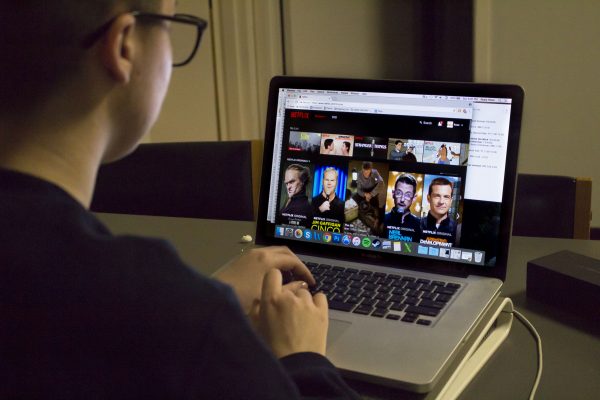Internet TV Gives “The Big Four” a Run for Its Money
January 26, 2017
Long ago, there was a strange phenomenon that occurred often, driving many to frequent outbreaks of frustration and angst. This phenomenon would occur when its victims either let their obligation slip their mind or found themselves too busy wrapped up in other things to make sure to tune into their weekly escape from reality. No matter what the cause, for the average American, missing an episode of their favorite television show was a means for major heartbreak.
Nowadays, however, this idea has been completely lost in the rise of internet television. According to a Nielson report on the amount of hours spent per week watching traditional television, the public’s viewing habits have been steadily declining for the past five years to about forty percent lower than what they were in 2011. This may suggest that watching television is slowly going out of style, but then how is it that almost any person you meet will gladly tell you about whatever show they are currently watching?
According to a study done by digital media firm Defy Media, younger generations are streaming shows on the internet about twice as often as they watch traditional television.
“I don’t have traditional television I only watch TV on Netflix, HBO GO, and Amazon Prime,” Rachel Meyer, Fordham College at Lincoln Center (FCLC) ‘20, explains.
“I prefer services like Netflix and Hulu over conventional television because there’s more power in my hands when I use those services,” Paolo Estrella, FCLC ‘20, said. “I’m able to choose what I want to watch and when I want to watch it as opposed to TV where I have to conform to its schedule.”
It seems that TV shows are more often being enjoyed through the monitor of a computer that through an actual TV. However, internet-centered companies such as Netflix, Amazon, and HBO Go have taken their idea to the next level, providing a new medium through which to access shows that originated on television. Netflix and Amazon have started to create their own series exclusive to their platforms and distribution channels.
At first, many seemed to dismiss these internet-originated series as less prestigious or impressive than those distributed by big-name television networks. It was suggested that shows on CBS, ABC, NBC or Fox were the “real deal” when it comes to quality entertainment. It was only on one of the big name networks that a series could be respected. However, if this year’s Golden Globe nominees are any indication of how successful a TV series is, than that old paradigm is starting to shift.
With Netflix leading overall with eight nominations, it is clear that its shows are no longer something to look down on. Netflix beat out Time Warner, Disney, Starz, Fox and ABC with this whopping number of nominations, showing that it is prevailing as a big name in the entertainment industry. Amazon was not far behind, roping in five nominations on its own— a number competitive with the number major television networks won.
“I think that internet-based television is slowly replacing cable television and I think that is really exciting,” Melanie Katz, FCLC ‘20, said. “I’m currently watching ‘A Series of Unfortunate Events’, a show produced by Netflix, and I think that it is a really impressive show. The writing, acting and production are all incredibly well done, which is in line with Netflix’s other original shows. I’m excited about the future of internet-based entertainment.”
It is clear that the former “big names” in television have to watch out. Not only is internet television becoming a more popular medium due to convenience, but it seems as though it is being regarded as a much more respectable source of original series than ever before. If you are an aspiring actor, internet television may now be more of a goal to reach for than a role in a “big network” series.












